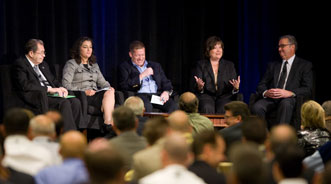Top Dealers and Remarketers Share Secrets That Are Driving Their Business to Success

SAN DIEGO –
In Thursday morning’s keynote address, several top industry executives and dealers took to the stage to discuss the state of the market and what they are doing to drive success.
The panel covered "Why Resale Values Are Critical to the Automotive Industry’s Long-Term Success."
Panelists included Brian Small, of General Motors; Scott McKim, of Huntington National Bank; Linda Silverstein, of Ford Motor Co.; Tammy Darvish, of DARCARS; and Jack Fitzgerald, of Fitzgerald AutoMall.
Darvish said her stores are being much more efficient and cutting costs that normally cut into profits. This is how her stores have found success in a downturn.
“The biggest challenge is financing (the consumer). The credit challenge is the biggest challenge,” she reiterated for attendees.
Meanwhile, Fitzgerald said his business is up in 2010.
“Our used-car business keeps on humming. All we had to do is stop wholesaling to help our bottom line. Used cars are always needed by buyers,” he highlighted.
Basically, Fitzgerald said his business has been relying a lot more on trade-ins to drive used-vehicle success, and it’s working.
As for Small, talking from an automaker level, he said GM can no longer be a production-based company. GM needs to be more of a demand-based company, he pointed out.
“We are making sure we don’t overproduce,” he said. “And the four brands that remain are up more than 20 percent (on the new-car side).”
McKim said his business has been “fantastic.” The company has show record increases in origination volume.
“More than half of the volume we originate is used,” he said. “Our intent is to underwrite the buyer no matter what the car. We want to get the customer into the right car. The key is did we appropriately underwrite the customer? Can they afford it?”
Huntington has been expanding of late, recently entering several New England states.
For his dealer customers, he said the key is having consistent sales times so dealers know when to look for Santander USA’s units. McKim said his business is different than the automakers’ in that his team isn’t selling a certain brand, but instead a slew of brands. He also noted models in Santander’s portfolio tend to be older with higher mileage.
Over at Ford, Silverstein said her company has been doing a very good job keeping inventories down on the new-vehicle side, which helps prices. It can also help give dealers more wiggle room so there is space for used-vehicle prices to grow some before they run into new-vehicle prices, she noted.
“There is a ceiling in what a person will pay for a used vehicle. There is a shortage of vehicles, which is positive for residuals, but negative for auctions and dealers,” she said.
Small also commented on GM’s acquisition of AmeriCredit. The subprime lender is now known as GM Financial.
“They will be a very important partner for us going forward. We’re looking at leasing and special financing programs with them. We’ve been doing a few pilots with GM Financial. But it’s still a very new relationship and it’s too soon to say more,” Small explained.
According to Darvish, in the tight credit markets, the automakers “with really strong captives will win.”
When asked about the growing trend of leasing, Fitzgerald, who said he has been a used-car dealer since the late 1950s indicated it just makes sense.
“Leasing just reflects the market. It’s a good deal for some of our customers. When rates come back and people have to pay something for money, I don’t know how people will react. I’m all for leasing," he said.
Fitzgerald went on to note that, “Technology is making it better for all of us. But just because something new came along, doesn’t mean the old is going away.” He is referring to the trend of more and more dealers turning online to buy inventory, saying that he still likes to see a car before he buys it. And that he doesn’t see physical auctions going away anytime soon.
In conclusion, Fitzgerald said the real sweet spot for dealers is older used vehicles. That dealers can clean them up or repair them, and as long as they are up front with customers about what the vehicle has been through, dealers can turn a strong profit on these vehicles.
Subscribe to receive our daily e-newsletter and never miss the latest industry news, trends, and insights across the used-car and remarketing space.


